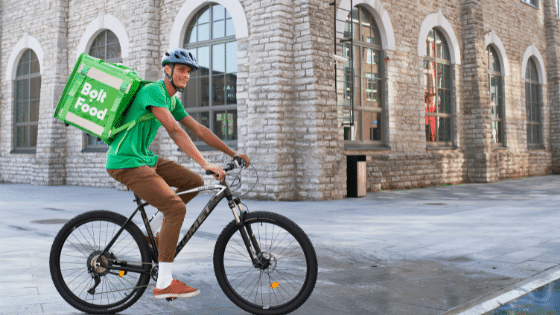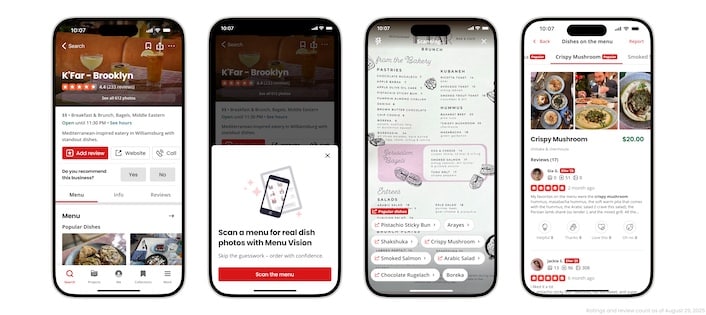We’ve seen several recent examples of global ride-hailing or delivery brands making some interesting adjacent moves that got us thinking about who will ultimately own the last mile.
For example, DoorDash and Glovo, two big names in food delivery in North America and Europe, respectively, are pushing deeper into the virtual dining space. Meanwhile, Bolt, the global ride-hailing service from Estonia, is pushing hard into the intensely competitive grocery delivery space.
Let’s take a quick look at each development.
Crossing Over into Ghost Kitchens
As a general rule, delivery apps like Door Dash have remained neutral. They serving as aggregators and logistics solutions for restaurants that wanted to expand their home delivery business. And of course, this picked up considerably during Covid. They generally have not gone into competition with their own customers.
As the ghost kitchen business has grown, platforms like Door Dash and Glovo have set aside that neutrality. Now both have launched their own ghost kitchen locations and virtual dining concepts. The thing about the ghost kitchens is that either company could use them to partner or compete with their customers.
DoorDash so far has used its expanding ghost kitchen operation to service others’ virtual restaurant concepts rather than develop its own. According to The Spoon, the food delivery company recently added a new ghost kitchen in San Jose. This expands on its first kitchen opened in Redwood City about two years ago.
The DoorDash Kitchens are servicing both virtual brands and brick and mortar brands. One of these, Canter’s Deli, is well known in LA and is using ghost kitchens as a way of extending its brand to a new city without opening a physical location there. It will be interesting to see if more restaurant brands follow this strategy.
Another interesting piece is that DoorDash is offering a turn-key service for restaurants in the new kitchen. Previously restaurants had to do their own cooking or packing up orders. Now DoorDash does it all — cook, package, and deliver. That is if the restaurant chooses to cede that much control to a third-party brand.
Helping Restaurants Go Virtual
Across the Atlantic, Glovo, which operates its food delivery platform in Europe and Africa, has also moved into the virtual dining space with Glovo Concepts. According to Forbes, this “is a full turnkey product with Glovo providing the brand name, menu, ingredients, recipes, and marketing materials. Restaurants can operate a brand with their existing staff and facilities if they have extra capacity in their kitchens.”
Forbes reports that Glovo has 300 restaurants using Concepts in Spain and Italy. The company plans to expand to 1,000 restaurants by year’s end. Glovo already operates “Cookrooms” which are ghost-kitchens designed for its restaurant partners to use the extra capacity to prepare delivery-only orders.
Barcelona-based Glovo says the Concepts business was created to help restaurants reeling from Covid get virtual brands up and running quickly.
The company also operates micro-fulfillment centers (aka dark stores) for its grocery delivery operations as well. In fact, in January Glovo signed a 100 million euro deal with the Swiss real estate firm Stoneweg to acquire warehouses for its dark store business, which pledges 15-minute delivery times in the cities where it operates.
Here is the question we have about the delivery apps getting into ghost kitchens. At some point do they become fully vertically integrated and begin to compete rather than partner with restaurants?
Bolt’s Bet on Grocery Delivery
And now there is Bolt, which is a ride-hailing and delivery rival to Uber operating in Europe, Asia, Africa, as well as Mexico and South America. The company just raised $713 million at a $4.75 billion valuation. The money is intended to fuel Bolt’s push into the online grocery delivery business.
According to CNBC, Bolt plans to push hard into grocery delivery dispute the fact that multiple delivery apps are competing fiercely for market share in cities across the continent. Back in March, for example, we wrote about Gorillas, a Berlin-based dark store and delivery app, raising a $290 million B round at a unicorn-level valuation.
Bolt, which, like Glovo, Gorillas, and others, promises to deliver groceries in 15-minutes, will roll out the grocery delivery in 10 European countries within the next few months. The countries targeted include Sweden, Portugal, Croatia, and Romania.
Notably, legendary VC firm Sequoia Capital is one of the lead investors in Bolt’s latest round.
Sequoia seems to have a growing interest in the online food industry. It also was among the investors in Accelerate’s $14.4 million A-round. Accelerate has built software that helps restaurants offer cloud kitchen services using their existing kitchen capacity. This sounds a lot like the “micro-cloud kitchen” concept I learned about from Grubtech CEO Moe Al Fayed.
What’s It All Mean?
In a highly competitive local logistics market, it’s dangerous to do just one thing. And this helps explain why everyone is crossing into adjacent lines. They need to chase scale, and in many cases, justify their gaudy valuations.
The pandemic helped sear in this lesson. Bolt founder Markus Villig said as much to CNBC in explaining its big push into grocery delivery.
“A year ago, we ran into the biggest crisis the company had seen,” Villig told the network in a recent interview. “We dropped over 80% as all the cities went into lockdown and ride-hailing was still the core business. What has happened in the last 18 months is that we’re a very different company now. Ride-hailing since then has already fully recovered. Delivery grew from something that was a relatively small business into now one of the fastest-growing food delivery companies in Europe.”
Diversifying to protect one’s flank is generally a wise tactic. We do wonder if this is the right place for Bolt to make such a big bet. Food delivery, particularly in big European cities, is starting to look like the scooter wars of a few years ago. And that didn’t end well.




